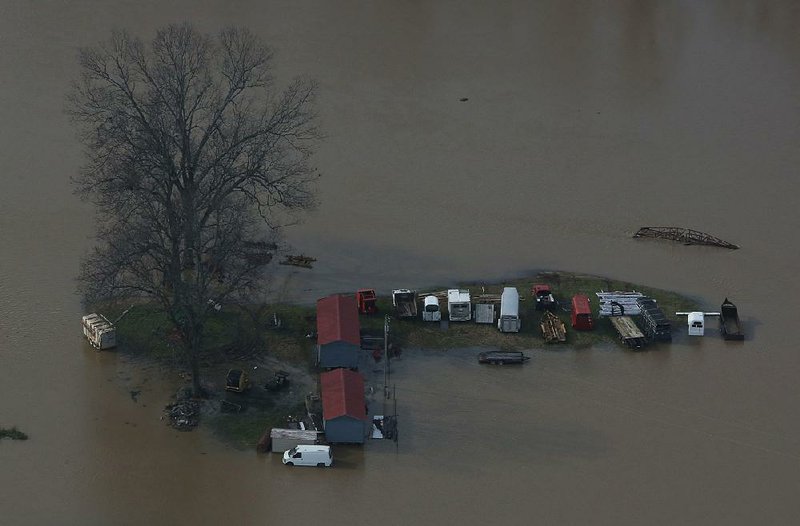BIGELOW -- Landowners near the Toad Suck levee along the Arkansas River have come to expect the extraordinary to be routine as floodwaters again breach an aging levee in need of repairs.
RELATED ARTICLES
http://www.arkansas…">Floodwaters in state to lingerhttp://www.arkansas…">Missouri, Illinois river levels fall
Assisted by the Arkansas National Guard and state prison inmates, residents on both the Faulkner County and Perry County sides of the levee near the Toad Suck Lock and Dam began sandbagging earlier this week. Still, numerous residents had to evacuate their homes as the fast-moving water poured across Arkansas 60 and onto their property.
It had not been long since the last breach occurred, during spring flooding of 2015.
"We wouldn't be in this shape we're in now if they'd fix that levee," resident Julie Burgess said after having to flee her home west of the levee near Bigelow.
"People like us lose everything," said her brother Charles Spears, who owns a nearby house that was also flooded.
"They've had ample time to fix that levee," Burgess said.
State Sen. Jason Rapert, R-Bigelow, agreed. Rapert said the thing that irritates him is that during a 1990 flood, the National Guard and others sandbagged "the very spot" that has been breached again.
"They knew that was a low spot in that levee," Rapert said. "They never did anything to repair that spot."
Rapert said he believes the levee could be repaired "easily" in a matter of days. All it would need is "a little more dirt material" put there, he said.
After last spring's flood, Rapert said he wanted the Arkansas Legislature to convene to address problems with the state's largely unregulated levee system. Gov. Asa Hutchinson agreed changes were needed but said the issue might best be addressed during a regular legislative session.
Hutchinson spokesman J.R. Davis said Thursday that the governor is reviewing the situation.
"Until he understands exactly the cost and everything it would entail, he can't commit to anything in a special session," Davis said.
The Legislature has a fiscal session scheduled for 2016, but the governor has said that "is not an appropriate time to deal" with the problem, Davis said.
Rapert said Hutchinson has assigned a state agency to help come up with solutions, which were sent to him about a month ago. Rapert said he will meet with the governor's staff and others Wednesday.
"This is a priority issue that they know must be addressed," Rapert said.
Davis referred other questions to David Maxwell, director of the Arkansas Department of Emergency Management.
Maxwell said Arkansas law prohibits the state from regulating state levee boards, but he would like to see the state change that law.
"I would much rather be worrying about sand boils outside of maintained levees rather than levees that haven't been maintained ... and [wondering] if they're going to hold" up during a flood, Maxwell said.
The problem, Rapert said, is that some levee boards have basically become nonexistent almost a century after they were first established.
Maxwell agreed.
"Some legislation is really going to have to be looked at to get levee boards re-established and functioning," Maxwell said.
Maxwell estimated it would cost "many millions" to get the state's levees in shape, and he said some levees have been maintained and are functioning well, as are the boards overseeing them.
"I want them [levees] controlled; I want them maintained," Maxwell said. "Who does it, I don't care."
Miles Brown, spokesman for the U.S. Army Corps of Engineers' Little Rock District, said the Corps is responsible for maintaining about five levees in the Little Rock district, which has more than 90 levees, including some in Missouri.
The Memphis office of the Corps is responsible for "major maintenance" along Arkansas levees abutting the Mississippi River, said spokesman Jim Pogue in Memphis.
The laws are "different all across the nation" as to who is responsible for levee maintenance, Brown said.
State Desk on 01/01/2016

